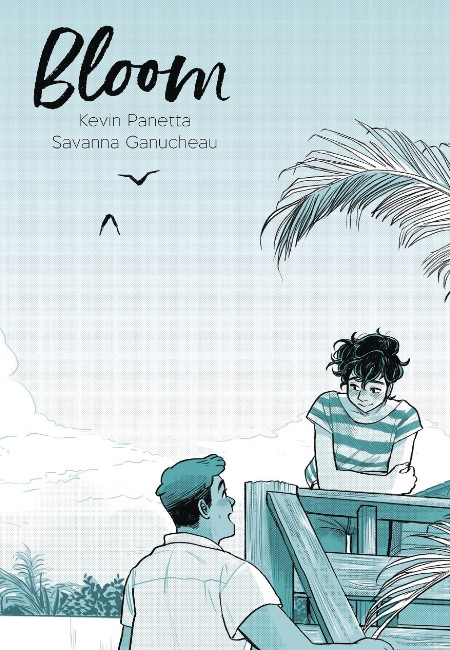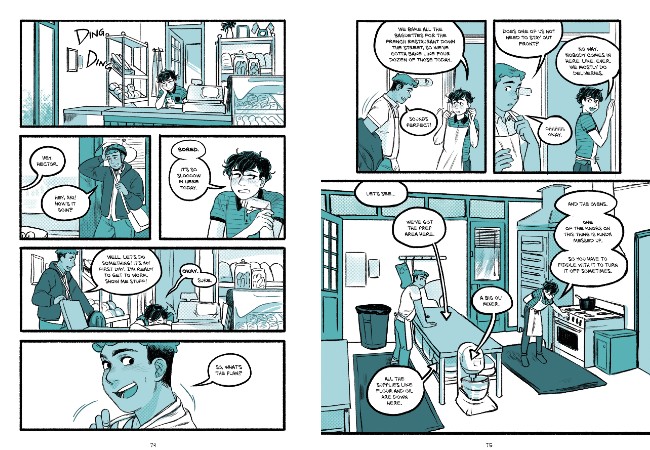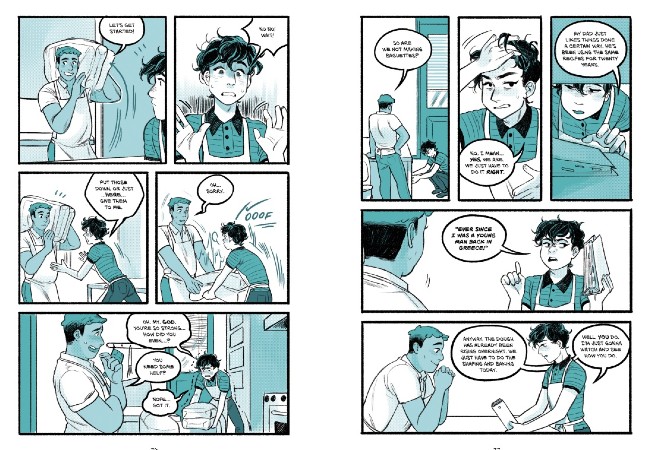
The ill-defined but promising period between the late teenage years and nascent adulthood comes with both a heady hope for the fulfillment of long-held dreams but also a terror that they might never be expressed at all.
In most cases, optimistic expectation wins out, a crash-or-crash-through positivity that sees many people leaping into the void of uncertainty, convinced that somewhere, deep down, lies the happy-ever-after landing they want.
Sometimes it works, sometimes it doesn’t, but there is usually never any question the leap will be attempted at least once, if only to see if the dream they have harboured for so long has legs.
Aristotle aka Ari is hoping his dream of moving to Baltimore to seek fame and fortune in the land of indie rock will happen, not simply because it seems like a very cool thing to do but because he is tired of working at the bakery owned by his Mum and Dad in the coastal idyll of East Beach.
A popular place to buy all kinds of baked goods for the thousands of tourists who throng the seaside town each year, it was somewhere that Ari loved as a kid, helping his dad out at every opportunity, but which has lately begun to feel suffocatingly small, especially now he had finished high school.
His only way out? Find someone to step into his shoes, and his dad, might, just might, let him go off to be the Passion Pit of the future.
So with the crash-or-crash-through positivity, or is that desperation, to which this review earlier referred, he puts up telegraph pole notices around town – a less-than-sophisticated approach that results in some, ahem, very strange people offering their services, one of whom saw her mum make stuff so how hard can it be? – and hopes for a baking knight on a white flour steed to come riding through the door.
What he gets is Hector, a young guy who loves baking, LOVES IT, and who has decided to stay in town for a while while he sorts through his recently-deceased grandmother’s place and tries to get over the end of his relationship to Andrew, who has stayed back in their hometown with the pair’s manic pixie bestie Meg.

It’s not a forever-after option for Hector but it’s good for now, and he finds a home at the bakery, one where he can indulge his love of creating baked wonders that dazzle all the senses, but also one where he finds family with Ari’s mum and dad who love and admire his passion and dedication to his craft, and by extension now to their business.
What he finds with Ari is altogether different.
Hector is everything Ari is not – assured, bright, vivacious, a young gay man who knows what he loves and wants and is eager to run and get it; Ari, by way of contrast, is not that certain of what wants, just that he doesn’t want to be baking bagels and getting up at 4am to go to state fairs and sell bagels and cakes to hungry revellers.
Of course, as is the way of coming of age romances, what he gets is someone who upsets any certainty he did have, making him wonder if the bright lights and promise of life in Baltimore is really what he wants?
As tales that occupy that murky but sweet spot when everything is possible and life has yet to circumscribe what is and isn’t on the agenda, Bloom is delightfully nuanced joy, exploring how Ari goes from petulant dreamer to headstrong enactor to someone who may, just may, want to stick around and see where the bakery and Hector take him.
Writer Kevin Panetta possesses a deft storytelling hand when it comes to Ari and Hector’s tale, offering enough exciting promise and excruciatingly painful setbacks to make the story of Bloom feel very real indeed.
He nails with exquisite agony what it is like to want to loose the bonds of what you know, to feel alarmed and exhilarated all at once when the opportunity arrives where you can do that, and to find that what you actually want looks nothing at all like what you thought you might have, possibly, could’ve wanted.
While Ari is a little hard to take at times, he is a 17-year-old who doesn’t so much have dreams as a laundry list of things he doesn’t want to do, and who is in that messy and emotional mixmaster-y process of sorting it all out.
So you have to cut the kid some slack and acknowledge he has a lot on his plate to work through – aided and abetted by Hector’s presence, which slowly becomes less and less a ticket to freedom as it is the reason to forgo that ticket and possibly stick around to see if maybe East Beach isn’t done with him quite yet.

Told in a style that is laid back, pleasantly slow moving and ripe with romantic portent, Bloom is graced by artwork so charmingly evocative that you can’t help but fall in love with Ari, his family, his close friends Hanna and Jake, Hector, naturally, who is wonderful and the whole idea of what might be.
Aiding that sense of being swept in something rom-comy and warmly uplifting is the artwork by Savanna Ganucheau who brings the characters alive with a vivacity and likability that is enchanting and grounded at every time.
Her use of double-page montage spreads is a masterstroke, giving particular scenes a chance to really spring alive and evoking everything from Ari’s increasing joy of being with Hector to Hector’s limitless love of baking to the lovely, rich, enduring bonds between Ari’s parents, or his friends.
They aren’t there so much to hurry things along, a usage to which montages are often out in cinematic romantic comedies, but to amplify what is there already, to emphasise that what we saw slowly growing and developing in words only is accompanied by emotions so rich and fulsome that they can only truly breathe when they’re allowed to expand with wordless exuberance.
You honestly feel like you have been thrown into the very midst of love and happiness and social abandon, intimate voyeurs of the nicest kind who have been permitted to see what’s really going on behind the stolen, furtive looks and half-expressed sentiments.
Bloom isn’t life coming alive, it’s love too, and being party to it through Panetta’s insightfully affecting but giddily fun writing and Ganucheau’s artwork is a real pleasure, the kind you don’t want to stop being a part of, and mourn the end of it.
It is worth taking your time to savour Bloom, to soak up the emotional vivacity of the montages, to laugh at the sheer loveliness of Ari and Hector discovering each other and a whole new path through life, and to reflect on what it felt like to have all that hope for the future and to find out that its resolution is often far richer and more rewarding that anything you could have expected.